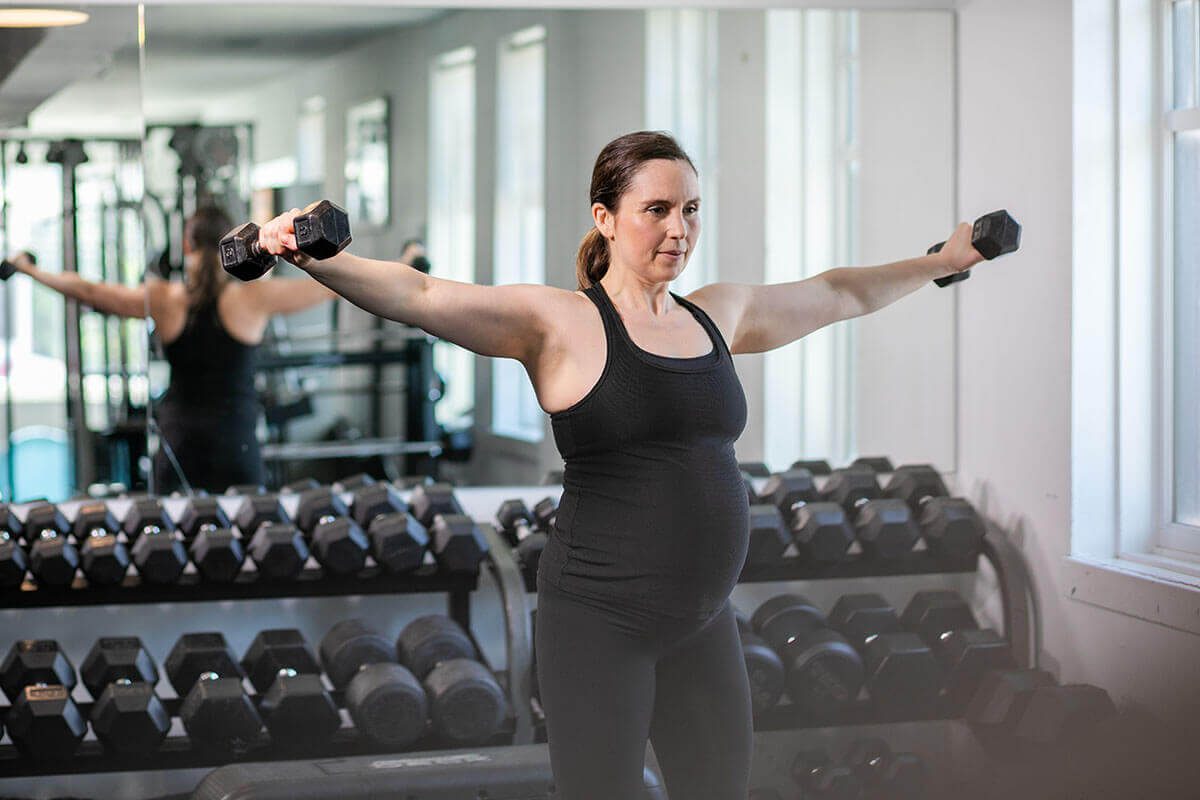There is greater awareness today of the benefits of physical exercise during pregnancy for both mother and baby. In this way, even health professionals now encourage pregnant women to stay active. A new reality, which leads trainers to specialize to offer exercise planning and sessions suited to each woman. For this reason, some have opted for higher degrees in prenatal fitness training such as the Professional Master’s Degree Fitness Instructor from TECH.
Considering the above, many sports centers and gyms have specialized programming for this type of client, who needs specific needs and measured work. Thus, strengthening the abdominal muscles, pelvic floor, and back muscles are three of the key axes on which the work of experts in prenatal yoga and Pilates or resistance and strengthening exercises.
Embarking on a fitness journey during pregnancy necessitates a comprehensive understanding of the body’s transformations throughout the trimesters. It is crucial to be knowledgeable about these changes and adapt exercise routines accordingly, ensuring the safety and well-being of both the mother and the developing baby.
Each trimester of pregnancy brings its own unique set of physiological adjustments, and modifying workouts accordingly is paramount. In the first trimester, it is essential to focus on exercises that support overall strength and flexibility while taking into account the potential fatigue and morning sickness that may be experienced. As the pregnancy progresses into the second trimester, the emphasis shifts towards exercises that promote good posture, strengthen the core and pelvic floor, and improve balance, considering the changes in weight distribution and the growing abdomen. During the third trimester, prenatal fitness training should primarily center around gentle movements that maintain cardiovascular fitness, alleviate discomfort, and prepare the body for labor and delivery.
Moreover, it is crucial to listen to the body and adapt routines in response to any physical limitations or medical recommendations. The intensity and duration of exercises may need to be modified, and certain activities that pose a risk of falls or abdominal trauma should be avoided. Consulting with healthcare professionals, such as obstetricians or prenatal fitness specialists, is invaluable in obtaining personalized guidance and ensuring that the exercise routine aligns with the specific needs and circumstances of the pregnancy.
By staying informed about the changes that occur during each trimester and being proactive in adapting prenatal fitness training accordingly, women can embark on a safe and effective fitness journey throughout their pregnancy. This approach not only supports overall well-being but also promotes a positive experience, allowing expectant mothers to embrace the transformative power of exercise while nurturing the health of themselves and their developing baby.
Beyond stretching
Pregnant women often engage in a variety of exercises that focus on gentle movements and stretching to maintain their physical well-being. However, the perception surrounding pregnancy and fitness is gradually evolving, thanks to influential athletes who have shattered stereotypes. Serena Williams, the renowned tennis champion, defied expectations by continuing her rigorous training regime throughout her pregnancy. Similarly, runners Alysia Montaño and Amber Miller made headlines when they fearlessly competed in races despite being at advanced stages of pregnancy, with Montaño racing at 34 weeks and Miller at an astonishing 39 weeks. These remarkable women have become powerful symbols of empowerment, challenging conventional notions and proving that pregnancy doesn’t have to hinder physical activity and athleticism.
Thus, during the first trimester, you can work on strengthening the core muscles and keeping cardiovascular endurance. In the second trimester, weight gain and changes in the center of gravity make it an ideal time to work on the pelvic floor and abdominal muscles.
During the final stage of pregnancy, the emphasis shifts towards low-impact exercises that provide gentle yet effective physical activity. Engaging in activities like walking on a treadmill, using an exercise bike, or opting for the elliptical or rowing machine can be excellent alternatives. These exercises minimize the impact on the body while maintaining cardiovascular fitness. However, it is crucial to prioritize listening to the woman’s body and adapting the training regimen based on medical recommendations. Each woman’s pregnancy journey is unique, and modifications may be necessary to ensure safety and comfort. Consulting with healthcare professionals and seeking their guidance is essential to tailor the fitness routine appropriately and ensure a healthy and beneficial experience for both the mother and the baby.
Specialization on the rise
Helping women to stay healthy at such an important time in their lives requires rigorous knowledge to avoid making harmful mistakes for her baby. In this sense, the existing demand in prenatal fitness training leads trainers to seek specializations that give them guarantees when performing their work and supply security to users.
In response to this need, TECH digital university has developed the Master’s Degree in Fitness Instructors, which contributes to a highly demanded education. It is a program that addresses the physiology of exercise and physical activity, the planning and administrative function of the monitor in the room, and the distinct types of training to the evolution of sports performance.
It focuses one of its modules on physical exercise and pregnancy, providing many quality multimedia teaching materials that can be accessed comfortably from a cell phone, tablet, or computer with an internet connection. An academic choice that meets the current needs of professionals and supplies flexibility when accessing the syllabus.
TECH Technological University
TECH Technological University stands out as a leading educational institution, with a solid reputation and a focus on quality prenatal fitness training and comprehensive education for its students. Thus, each year it attracts more than 100,000 new students and half a million enrolled in all its faculties.
Trustpilot, a review and opinion platform, considers this institution as the best-rated university in the world by its own students with a score of 4.5 out of 5 overall. This reflects their great satisfaction with the knowledge acquired and the quality of the teaching received.
Also, the Financial Times ranks it as one of the 200 fastest-growing companies in recent years, which is evidence of its constant evolution and relevance in the educational landscape. Likewise, the employability rate of students after completing their programs is high, with 99% according to the consulting firm KPMG. These facts attest to its excellence and its commitment to updating professionals, preparing them to face the challenges of today’s world.
Maintaining fitness during pregnancy holds significant importance for both the expectant mother and the developing baby. Regular exercise during pregnancy can bring about a multitude of benefits that positively impact overall well-being. Firstly, staying active helps manage weight gain and promotes healthy weight management, reducing the risk of complications such as gestational diabetes and excessive weight gain. Additionally, maintaining fitness supports cardiovascular health, improves circulation, and enhances endurance, which can be advantageous during labor and delivery.
Furthermore, engaging in appropriate exercise routines can help alleviate common discomforts associated with pregnancy, such as back pain, swelling, and fatigue. Regular physical activity strengthens muscles and improves flexibility, which can aid in better posture and balance. It also promotes mental well-being by reducing stress, anxiety, and symptoms of depression, ultimately contributing to a healthier emotional state throughout pregnancy.
Moreover, prenatal fitness can have long-term benefits for both the mother and child. Studies have shown that exercise during pregnancy can contribute to a healthier birth weight for the baby and may even lead to improved cognitive development in children. Additionally, maternal fitness sets a positive example for the child, emphasizing the importance of an active and healthy lifestyle from an early age.
In conclusion, prenatal fitness training is not only safe but highly beneficial. It supports the overall health and well-being of both the mother and the baby, facilitating a smoother pregnancy, promoting cardiovascular health, managing weight gain, reducing discomforts, and enhancing mental wellness. By prioritizing appropriate physical activity and consulting with healthcare professionals, expectant mothers can embark on a journey that embraces the transformative power of prenatal fitness and its positive impact on their lives.








